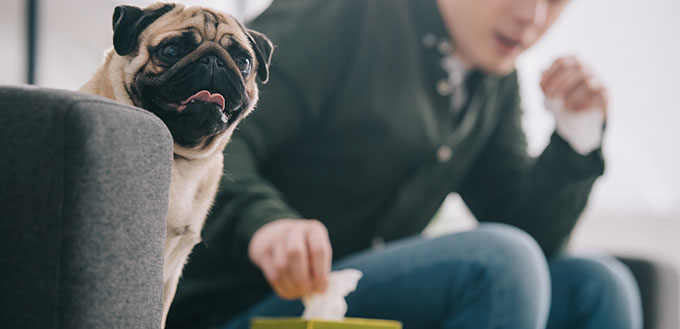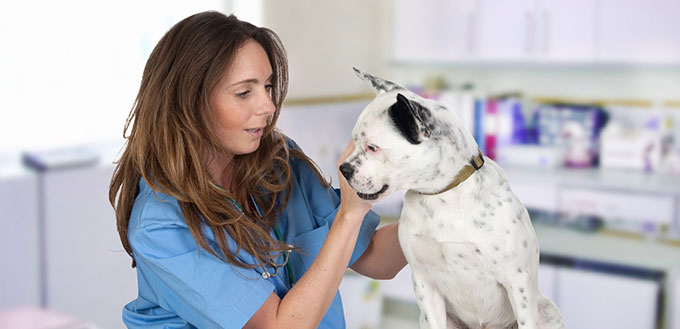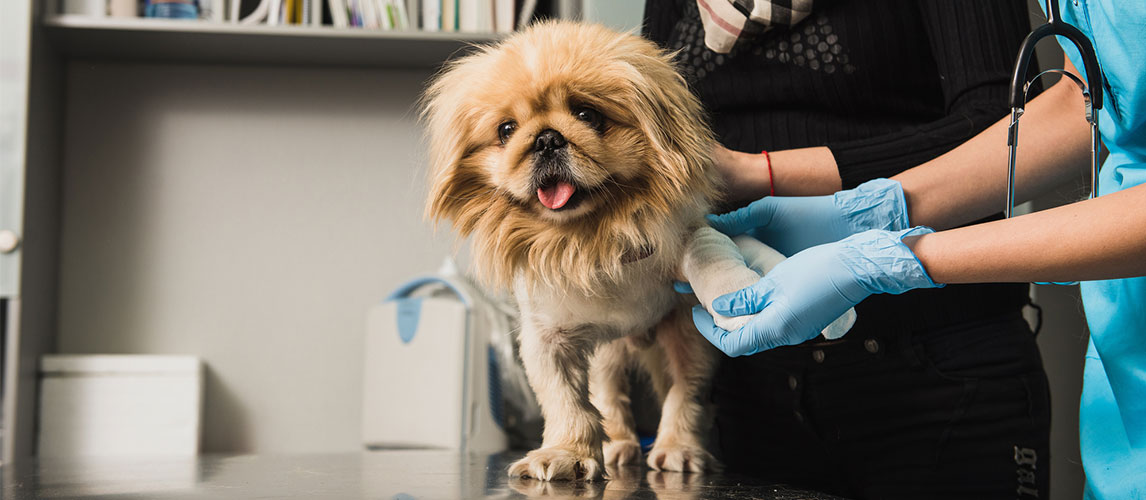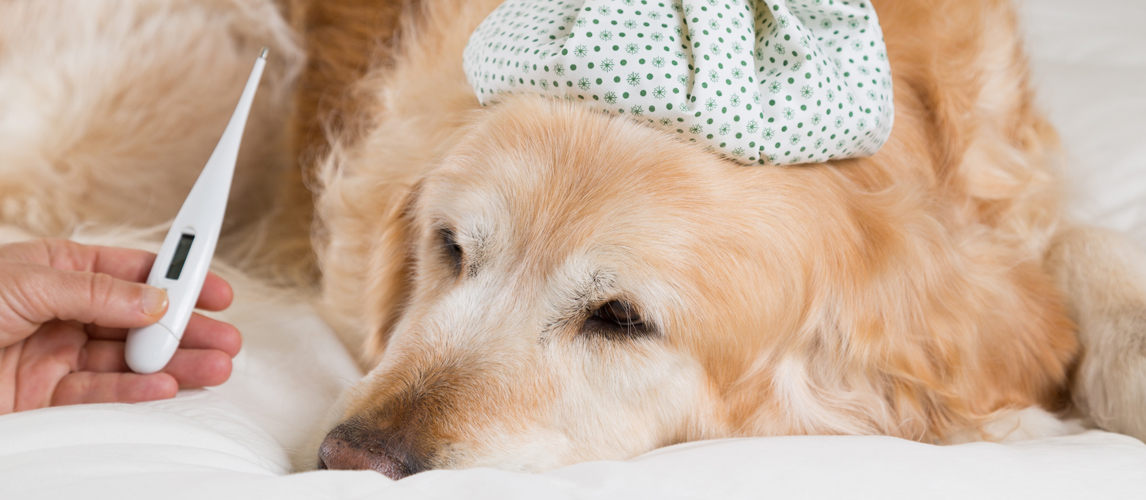Since Coronavirus COVID-19 was declared a global pandemic by the World Health Organization, hygiene, health and potential infection have been at the forefront of all our minds. And, for pet owners, the most frequent questions they have for their vet are – what is coronavirus in dogs, can dogs get human viruses such as COVID-19, and can they catch the virus from their pet?
With so much information out there, it can be difficult to cut through the advice. So, we break it all down to give you the current must know facts about dogs, Canine Coronavirus Disease and COVID-19.
Coronavirus is a ‘family’ of viruses that can cause sickness in both humans and animals. In humans, coronavirus causes illnesses such as the common cold, SARS and now COVID-19. Coronavirus in dogs can manifest itself as ‘kennel cough’ as well Canine Coronavirus Disease. These variants of coronavirus are not the same as COVID-19 and cannot be passed onto humans.
Canine Coronavirus Disease (CCV) is a highly infectious dog virus and in most cases is transmitted either through oral contact with infected feces, contaminated food bowls or nose to nose contact with an infected dog. Unlike COVID-19, which is a respiratory infection, CCV affects the canine gastrointestinal system. CCV often shows no symptoms, however in some dogs, it may result in abdominal pain and sudden onset diarrhea, along with reduced appetite and general lethargy. The symptoms of Canine Coronavirus Disease typically last between two and 10 days and while there is no treatment, the disease will usually resolve itself with no lasting effects. However young puppies may experience more severe symptoms due to their immature immune system and adult dogs do run the risk of a secondary infection which may extend their recovery time. Dogs who have recovered from Canine Coronavirus Disease may still be carriers for up to six months after their initial infection. There is a coronavirus vaccine for dogs available, but it does not provide protection for any other coronavirus strains, including COVID-19.
Can Dogs Get COVID-19?
There is currently no evidence to show that dogs can contract COVID-19 or that it causes them any ill-effects. There were two recently reported cases of dogs in Hong Kong testing a positive for mild COVID-19 but there were no clinical symptoms and both pets had been in close proximity to their owners, who had been diagnosed with the disease. It is thought the dogs had been breathing contaminated air from their owners, resulting in small signs of the virus after their nose and mouth were swabbed. COVID-19 is not believed to be a health threat to dogs or any other companion pets.
Can Dogs Spread COVID-19?
At this moment in time, there is also no evidence that even if infected, a dog can spread COVID-19, either to a human or another dog or animal. Animal experts around the world concur that there have been no reports of dogs falling sick with the disease, and that canines are not a source of COVID-19 infection. The predominant source is human to human transmission.
However, that doesn’t mean you should be no less vigilant with your pets and your health during these challenging times. And hygiene when it comes to both you and your pet is paramount.
Adhering to the current guidance on hygiene, handwashing and social distancing will go a long way to protect you, your family and your pet. And, while there is no current evidence your pooch can contract COVID-19, keeping them away from possible sources of infection will help to keep you safe. The COVID-19 survives best on smooth surfaces such as door handles and worktops, less so on more porous materials, which includes pet fur. However, it doesn’t totally mitigate the risk so when it comes to how to pet and look after your dog during the coronavirus pandemic, prevention is better than cure.
To protect yourself:
- Always thoroughly wash your hands before and after touching or interacting with your dog, especially after their daily walk outside.
- It is a wise move to keep your dog away from people as you want to avoid them being petted by strangers and run the slight risk that the virus could be transferred from their hands to your pet’s fur, face or collar.
- Letting your dog off their lead while on their walk is also not a good idea, as you cannot control who they encounter, and you will be unable to adhere to the all-important social distance.
- And don’t pet anyone else’s dog, even if you know them as it possible that they could be carrying the virus from their owner, although the experts believe the risk of such cross-infection is low.
- You could also consider wiping your dog’s paws with paw wipes after their walk, before they come back into your house.
You May Also Like: Dog Wipes
Should Infected Pet Owners Avoid Close Contact With Their Dogs
If you are opting for self-isolation for health reasons or have been tested positive for COVID-19 and are now recovering at home, then it is essential that you put your pet on lock down too. That means ensuring they avoid contact with any other animals or humans outside of your quarantined household. And, unfortunately, it does mean that if you are infected you need to keep your pooch at arms’ length too. If possible, you should consider getting another member of your household care for your pet while you are sick and focusing on getting better.
This may seem harsh – when you are feeling poorly, those dog-cuddles always help to make you feel just that little bit better – but you need to reduce the risk of you making your pet a physical carrier of COVID-19 and spreading the virus to others. As we have already noted, the risk of the virus remaining active on their fur or your dog transmitting the disease is low, but you really don’t want to take that chance. And with dogs, you also need to reduce the risk of you getting any other infections, particularly as your immune system is working overtime already to fight off the effects of COVID-19.
And, even if you are keeping your pet at a distance during your quarantine, wash your hands regularly and ensure your dog’s areas of the home – food and drink bowls, sleeping area, exercise yard – are wiped down regularly to keep them clean.
Related Post: Pet-Safe Floor Cleaners
And Finally
If you in are anyway concerned about the health of your dog or suspect he may have Canine Coronavirus Disease then please do get in touch with your veterinarian for further advice.
Sources:
- Coronavirus and Pets: FAQs for Owners, College of Veterinary Medicine
- Should My Pet Be Tested For COVID-19?, Pet Health Network
- Dr. Debora Lichtenberg, VMD, Coronavirus And Pets: What You Need To Know, Petful
Note: The advice provided in this post is intended for informational purposes and does not constitute medical advice regarding pets. For an accurate diagnosis of your pet's condition, please make an appointment with your vet.








